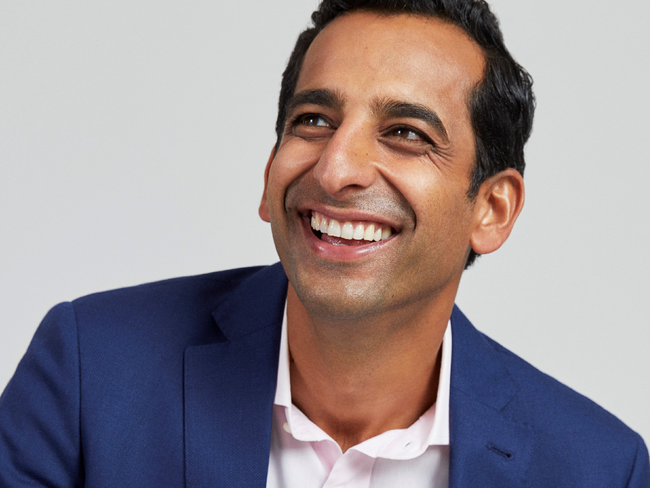Paytm drops another 13%; panel adopts personal data bill
.jpg)
Source: Giphy
Also in this letter:
■ Data protection bill adopted, to be tabled in winter session
■ SoftBank Vision Fund promotes Juneja to managing partner
■ Swiggy food delivery revenue grew 56% in Apr-Sept: Prosus
Paytm’s freefall continues, share price drops 13% on second day

Paytm founder Vijay Shekhar Sharma
On Monday morning we reported that Paytm founder Vijay Shekhar Sharma had held a four-hour virtual town hall with his employees on Friday, when the markets were shut, after the company’s stock tanked by more than 27% on its market debut the previous day.
Paytm has never had anything easy up front, he told them, and they shouldn’t read too much into criticism of the company’s business model or get bogged down by the poor showing on day one.
Oopsy: But on Monday, shares of One97 Communications, Paytm’s parent company, extended their losses, dragging the company’s market cap under Rs 1 lakh crore ($13.45 billion). The stock fell as much as 18.72% intraday to Rs 1,271.25 on BSE before paring some of the losses to end the day 13.03% lower at Rs 1,360.30.
This gave Paytm a market cap of Rs 88,184.67 crore, compared to its IPO valuation of almost Rs 1.50 lakh crore.
Criticism: Paytm’s disastrous trading debut has sparked criticism that the company and its investment bankers had pushed too hard. Founder and chief executive Vijay Shekhar Sharma had repeatedly made clear that he wanted Paytm’s IPO to be the biggest-ever in India, surpassing the record set by Coal India in 2010.
“Investors should wait a bit for the stock to settle down,” Mohit Nigam, a fund manager with Hem Securities, told Bloomberg on Monday. “There is too much volatility and pessimism in the stock.”
Over the weekend, Paytm released financial details for October. Its gross merchandise value rose 131% year-on-year to Rs 83,200 crore. Loan disbursals, which analysts see as key to Paytm turning profitable, increased more than 400% to 627 crore. But critics have questioned the company’s prospects in recent months. While sales at its payments and financial-services arm rose 11% in FY21, overall revenue dropped 10% amid intensifying competition, the company said in July.
Kotak sets the record straight: Meanwhile, as Paytm’s share price continued to nosedive on Monday, many investors took to social media to vent. This proved a misjudgement for Twitter user Harshad Shah, who wrongly directed his criticism at Uday Kotak, chief executive and managing director of Kotak Mahindra Bank.
He posted, “@udaykotak please take responsibility for wrong pricing of #Paytam IPO and reward them to compensate [for] the losses.”
Kotak responded within an hour and set the record straight. “Mr. Shah please get your facts right. Kotak did not lead manage Paytm. Kotak [Mahindra Capital] did lead manage Zomato at issue price 76 (current market price 150), Nykaa at issue price 1125 (current market price 2100),” he posted at 2.50 pm.
Paytm’s IPO was in fact managed by Morgan Stanley, Goldman Sachs, JPMorgan Chase & Co, ICICI Securities and Axis Capital Holdings.
Though Kotak’s tweet didn’t mention it, Kotak Mahindra Capital was also a lead manager for the IPO of Policybaaar’s parent firm PB Fintech. The company’s shares ended the first day of trading on November 15 at Rs 1,202.90, or 22.74% higher than the issue price of Rs 980. At close on Monday, the share price was Rs 1,247.85.
Panel adopts draft of data protection bill, to be tabled in winter session

The joint parliamentary committee on the Personal Data Protection Bill has adopted its draft report, Rajya Sabha MP Jairam Ramesh and Lok Sabha MP Manish Tewari confirmed on Twitter. It will now be tabled during the winter session of Parliament they said. The JPC had met on Monday afternoon to consider and adopt the draft report.
Dissent: Several opposition MPs, including those from the Congress, TMC and BJD, submitted dissent notes. These included Ramesh, Tewari, Gaurav Gogoi and Vivek Tankha from the Congress, the TMC’s Derek O’Brien and Mohua Moitra, and the BJD’s Amar Patnaik.
“It’s done”: Ramesh later wrote on Twitter, “Finally, it is done. The Joint Committee of Parliament has adopted its report on the Personal Data Protection Bill, 2019. There are dissent notes, but that is in the best spirit of parliamentary democracy. Sadly, such examples are few and far between under the Modi regime.”
Tewari posted, “For the record submitting my dissent note on the Personal Data Protection bill to the Secretariat of the Committee after the final meeting of the joint committee on data protection.
We started in December 2019 and finished in November 2021.”
Catch up quick: The Personal Data Protection Bill 2019 was approved by the union cabinet in December that year. It was drafted following a judgement by the Supreme Court in 2017 that said privacy was a fundamental right of citizens.
The bill was expected to be tabled during the previous Parliament session but the JPC asked for an extension after many of its members left the panel. Chaudhary only became its chairperson in July after Meenakshi Lekhi was made a union minister.
What is the PDP Bill? The PDP Bill was created to ensure that India has a robust legal system governing and regulating data privacy. It aims to create a Data Protection Authority to ensure that citizens’ data remains secure and private online.
It also says that certain types of information deemed “sensitive”—such as financial information—must be stored on servers in India.
Yes, but: The bill also contains various exemptions for governments, which have been criticised as excessively broad.
It allows the union government to exempt any of its agencies from its provisions in the interest of national security, public order, sovereignty and integrity of India, and friendly foreign relations.
It also says the government can exempt any of its agencies from the bill’s data processing provisions for preventing, investigating, or prosecuting any offence, or personal, domestic or journalistic purposes.
SoftBank Vision Fund promotes Sumer Juneja to managing partner

SoftBank Vision Fund’s Managing Partner Sumer Juneja
Global technology investor SoftBank Vision Fund has promoted Sumer Juneja, who heads its India office, to managing partner. The development comes on the back of a record year of funding for Indian startups, and at a time when the Japanese firm has invested close to $3 billion in the country.
Juneja, who joined SoftBank in 2018 as partner and head of India, has since led its investments in Swiggy, social commerce startup Meesho and edtech firm Eruditus, among others.
Before joining SoftBank, he worked at Norwest Venture Partners, where he was a director at its India office.
Juneja is credited with setting up an India team, diversifying the India portfolio for SoftBank beyond ecommerce and ride-hailing, and backing companies in edtech, business-to-business, SaaS and enterprise.
SoftBank has also seen a few of its portfolio firms go public, including PB Fintech, which runs Policybazaar, and Paytm, which had a poor market debut last Thursday.
Churn: Along with Juneja, SoftBank is also promoting Lydia Jett, Vikas Parekh and Dennis Chang to managing partners. In all, there are 13 managing partners at the Vision Fund, including the four additions. These changes come amid a slew of departures in the senior ranks of SoftBank Vision Fund. Deep Nishar, a senior managing partner at the fund, left recently.
Swiggy’s food delivery revenue grew 56% from April to Sept, Prosus says

Swiggy delivered a “strong recovery” through the first half of the current financial year—April to September—as its revenue from food delivery grew by 56% over this period, up 91% from pre-Covid levels, its investor Prosus said in a regulatory filing while announcing the South African group’s results.
Quote: “This was driven by higher demand during the second Covid-19 wave in India and expansion of Supr Daily and Instamart in the groceries business. We believe Swiggy is well funded to capitalise on recent momentum and well-positioned to improve its platform’s competitiveness by investing in product and technology, and reinforcing its artificial intelligence capabilities,” Prosus said.
Going strong: Prosus, the Dutch-listed arm of Naspers, said in a blog post that the performance of its global food businesses, which include Bengaluru-based Swiggy, remained strong on the back of complementary adjacencies such as convenience and grocery delivery. According to the post, Swiggy’s grocery revenues grew 75% compared to March 2021.
The Swiggy model: According to the filing, Swiggy has been able to register growth due to its focus on recovery “by reactivating users, increasing monthly frequency, and returning user conversion to pre-Covid-19 levels.”
It said that Swiggy was servicing 1.59 million orders a day, and its gross merchandise value (value of food and non-food orders) was $984 million in the period under consideration, up 69% year-on-year. Zomato’s gross order value for food delivery stood at $721 million between July-September this year.
A total of 128,000 restaurants were on Swiggy, the same as pre-covid levels, Prosus said. In comparison, Zomato had 173,00 active restaurant partners as of September.
Swiggy One: In a separate development, Swiggy plans to expand its new membership programme ‘Swiggy One’ to 500 cities in the next two weeks. The programme went live in four cities—Lucknow, Pune, Trivandrum and Vijayawada—on November 19.
What is Swiggy One? It offers unlimited free deliveries from restaurants and Swiggy’s grocery delivery service Instamart. It costs Rs 299 for the first 3 months and at Rs 899 for 12 months.
More to come: The Bengaluru-based company said that in the coming months additional discounts and benefits will be extended to Swiggy’s other offerings including its pick-up-and-drop service Genie, and Meat stores.
In August, rival Zomato had launched Zomato Pro, which offers unlimited free deliveries and dining-out benefits.
Tweet of the day
ETtech Done Deals

■ Sleepy Owl, a direct-to-consumer coffee brand, has raised $6.5 million in Series A funding round led by existing investor Rukam Capital and DSG Consumer Partners. The fresh capital will be used to beef up its core team, build a robust distribution network across India, and for marketing.
■ Precision agriculture platform Fasalhas raised $4 million in a pre-Series A round led by 3one4 Capital with participation from existing investors Omnivore and Wavemaker Partners. Other investors in this round include Genting Ventures (Malaysia), The Yield Lab Asia-Pacific, Antares Investments, and Sandeep Singhal of Nexus.
■ Enterprise SaaS platform Zvolv said it has raised $1.5 million in a round led by JSW Ventures, a tech-focused venture capital fund. The round also saw participation from Riso Capital, a Silicon Valley-based VC fund that invests in India-based startups. Zvolv plans to use the funds to expand its customer base globally, drive rapid adoption in an increasingly work-from-anywhere world, and double down building out AI/ML capabilities on the platform.
Today’s ETtech Top 5 newsletter was curated by Arun Padmanabhan in New Delhi and Zaheer Merchant in Mumbai.
For all the latest Technology News Click Here
For the latest news and updates, follow us on Google News.

